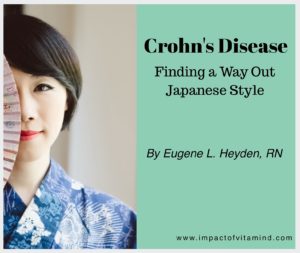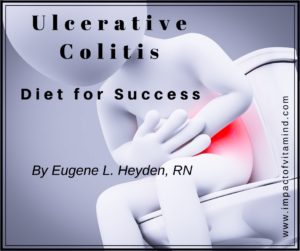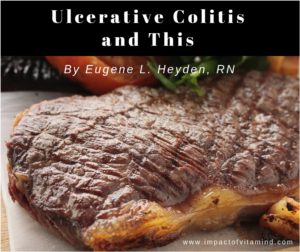Last revision: 12-05-23
By Eugene L. Heyden, RN
Many individuals, physicians included, hold the believe that diet has little to offer in the battle against ulcerative colitis. This article may change a mind or two. It outlines the experience of Yuto (a pseudonym), a Japanese physician who was faced with a choice: follow the drug therapy route or adopt a diet with a proven track record of success in the battle against IBD, ulcerative colitis included. If Yuto would have chosen drug therapy over diet therapy, it is likely we would never have heard his story. And who knows what would have happened? He certainly may have succeeded with drug therapy. But we’ll never know. Perhaps, just so I would share his story with you, he chose diet therapy.
Case report
Yuto was 38 at the time he decided he was big enough. For a male, five foot five inches, a weight of 160 pounds was simply too much for him to accept, representing a probable 20 to 30-pound degree of overweightfullness. (Did I just create a new word?) For Yuto, it was time to diet.
The report relaying Yuto’s experience, recently published in a reputable medical journal, is a little shy on detail, but it was reported that the diet Yuto followed to lose weight was a high protein/low carbohydrate diet, patterned after the Atkins diet. Accordingly, “He decreased his white rice consumption to approximately one-third and consumed meat every day and minced or processed meat 3 to 5 servings per week.” (Chiba et al., 2016)
On the diet, Yuto achieved a 13-pound weight loss within a period of approximately 3 months—and continued the high protein/low carbohydrate diet as a way of life, ostensibly to effect further weight loss. A little over a year after starting the diet, he began to experience an occasional bloody stool. This went on for a month or so, then “occasional” gave way to “daily.” This continued for several months before Yuto received proper medical attention and the diagnosis of ulcerative colitis, some 15 months after starting his high protein/low carbohydrate diet.
Did I mention Yuto was a physician? Perhaps, as a physician, he was fully aware of the dangers of drug therapy, even the first-line “safer” therapy for ulcerative colitis, 5-ASA (Asacol or the like). For whatever reason, Yuto opted not to follow this path. His ulcerative colitis was considered mild, so perhaps it would just go away, and the risks posed by drug therapy, even 5-ASA, were considered unacceptable at the time. Perhaps he knew
“. . . patients administered 5-ASA or its derivatives suffer several serious adverse conditions, such as anorexia, dyspepsia, nausea/vomiting, hemolysis, neutropenia, agranulocytosis, folate malabsorption, reversible, male infertility, and neuropathy.” (Wu et al., 2009)
And he certainly he must have known
“Treatment with mesalamine-containing drugs is the gold standard for treatment of mild-to-moderate UC, but the results found with this treatment are far from satisfactory.” (Sood et al., 2009)
According to the report, Yuto was aware of a dietary alternative to drug therapy. And some four months after his ulcerative colitis diagnosis, and many bloody poops later, Yuto entered an impatient treatment program specializing in the treatment of IBD using a plant based, semi-vegetarian diet.
The program’s director and associates write: “We recognize IBD as a lifestyle-related disease mediated mainly by a westernized diet.” (Chiba et al., 2016) To give us further insight into the rationale for the plant based, semi-vegetarian diet, the authors state:
“The greatest environmental factor for IBD is diet-associated microflora. Diets rich in animal protein and animal fat cause a decrease in beneficial bacteria in the intestine. Prebiotics, foods that increase beneficial bacteria in the gut, are mostly extracts of plants. Therefore, a semi-vegetarian diet was designed to combat dietary westernization.” (Chiba et al., 2016)
With respect to the diet, basically
“Our semi-vegetarian diet is a lacto-ovo-vegetarian diet [allowing dairy products and eggs] with an additional serving of fish once a week and meat once every 2 weeks. This semi-vegetarian diet is primarily a plant-based diet. Contemporary meals are far from a semi-vegetarian diet. Dietary intervention to restore dysbiosis in gut microflora is essential in the treatment of IBD.” (Chiba et al., 2016)
Now back to Yuto. Sometime during his 11-day inpatient program, Yuto’s ulcerative colitis went into remission, doing so with diet and diet alone. Diet alone! (Yes, it’s true.) Bloody stools were no more. His remission lasted 11-months, until faint blood was noticed in his stool, occurring every other day. This suggested that his ulcerative colitis had returned and prompted both a confession and a promise. Yuto confessed “He had been too busy to maintain a plant-based diet but would try to restore his diet to a sound plant-based diet.”
You can read Yuto’s story in its entirety by going online and locating the following paper:
Chiba M, Tsuda S, Komatsu M, Tozawa H, Takayama Y. Onset of ulcerative colitis during a low-carbohydrate weight-loss diet and treatment with a plant-based diet: a case report. The Permanente Journal. 2016;20(1):80. https://www.ncbi.nlm.nih.gov/pmc/articles/PMC4732800/
What can we learn from the case report? Three things clearly stand out: 1) The Western diet, with all the heme, all the iron, all the sulfur, all the saturated fat, and all the flavor would appear to be a trigger for ulcerative colitis and a driver for its continuation, consistent with the conclusions of the experts. 2) A diet of abundant prebiotics, as per high dietary intake of fruits and vegetables, and a diet very low in animal protein and fat, can be an effective treatment for ulcerative colitis. And 3) drugs are not always necessary in the treatment of this disease. Certainly, the story of Yuto is a window into the possibilities of treating ulcerative colitis with a dietary practice that counters the evils of the Western diet and restricts exposure to both saturated fat and animal protein.
Now as far as an individual getting enough protein on a semi-vegetarian, plant-based diet, don’t worry at all. If you do things right, you can get all the protein you need from plant sources—and with the inclusion of milk products and eggs in the diet, there is no problem (Physicians Committee for Responsible Medicine).
What’s behind the success?
So, what happened? What is this diet all about? Why does it work? Why should we take notice? You can find some of the answers in the articles recommended below.
Related Posts (Click on image to open)
References:
Chiba M, Tsuda S, Komatsu M, Tozawa H, Takayama Y. Onset of ulcerative colitis during a low-carbohydrate weight-loss diet and treatment with a plant-based diet: a case report. The Permanente Journal. 2016;20(1):80.
Physicians Committee for Responsible Medicine. Protein. https://www.pcrm.org/good-nutrition/nutrition-information/protein
Roediger WE 2008 Nitric oxide from dysbiotic bacterial respiration of nitrate in the pathogenesis and as a target for therapy of ulcerative colitis. Alimentary pharmacology & therapeutics. Apr 1; 27(7):531-541
Sood A, Midha V, Makharia GK, Ahuja V, Singal D, Goswami P, Tandon RK. The probiotic preparation, VSL# 3 induces remission in patients with mild-to-moderately active ulcerative colitis. Clinical Gastroenterology and Hepatology. 2009 Nov 1;7(11):1202-9.
Vidal-Lletjós S, Beaumont M, Tomé D, Benamouzig R, Blachier F, Lan A. Dietary Protein and Amino Acid Supplementation in Inflammatory Bowel Disease Course: What Impact on the Colonic Mucosa?. Nutrients. 2017 Mar 21;9(3):310.
Windey K, De Preter V, Verbeke K. Relevance of protein fermentation to gut health. Molecular nutrition & food research. 2012 Jan 1;56(1):184-96.
Wu SL, Chen JC, Li CC, Lo HY, Ho TY, Hsiang CY. Vanillin improves and prevents trinitrobenzene sulfonic acid-induced colitis in mice. Journal of Pharmacology and Experimental Therapeutics. 2009 Aug 1;330(2):370-6.
Disclaimer: This article is presented solely for informational purposes. The information contained herein should be evaluated for accuracy and validity in the context of opposing data, new information, and the views and recommendations of a qualified healthcare professional, and is not to be substituted for professional judgment and guidance or to provide reason to neglect or delay appropriate medical care. It is the reader and reader only who bears the responsibility for any actions that could be construed as being a response to the information contained herein. The statements and opinions expressed by the author have not been reviewed or approved by the FDA or by any other authoritative body, nor is the author endorsing any product or specific therapy. This article is offered to the reader to broaden his or her understanding of the issues discussed and to help identify options that may be suitable for the individual to pursue, on behalf of self or others, under approval and direction of a qualified physician. The author and publisher offer no guarantees of the accuracy or validity of the quotations incorporated into this article or the accuracy or validity of the information presented by the references used in this article.
Copyright © 2018–2023 Eugene L. Heyden, RN
All Rights Reserved

DISCLAIMER: The book excerpts and articles featured on this website are offered solely for informational purposes. The information contained therein should be evaluated for accuracy and validity in the context of opposing data, new information, and the views and recommendations of a qualified health care professional, and not to be substituted for professional judgment and guidance or to provide a reason to neglect or delay appropriate medical care for self or for others. It is the reader and reader only who bears the responsibility for any actions that could be construed as being a response to the information presented. The statements and opinions expressed by the author or authors of the information provided on this website have not been reviewed or approved by the FDA or by any other authoritative body, nor is the author endorsing any product or specific therapy mentioned. The book excerpts, articles, statements, and opinions are offered to the reader to broaden his or her understanding of the issues discussed and to help identify options that may be suitable for the individual to pursue, on behalf of self or others, under approval and direction of a qualified physician or medical team member. All questions of a medical nature which arise from the book excerpts and articles available on this website should be directed at qualified health care professional.













